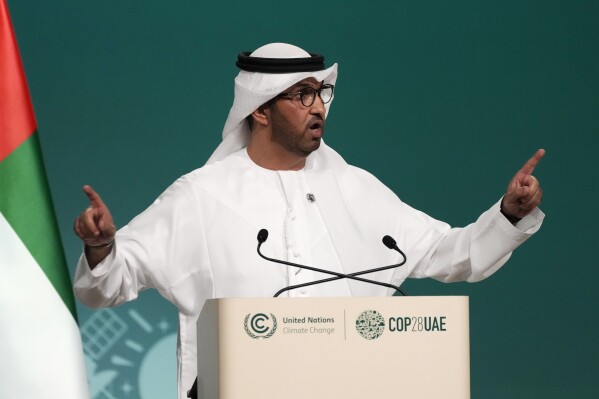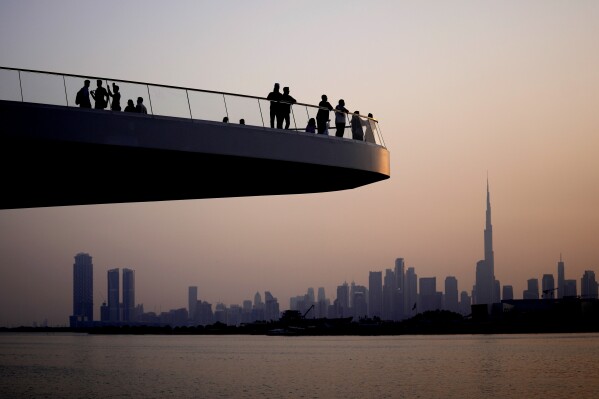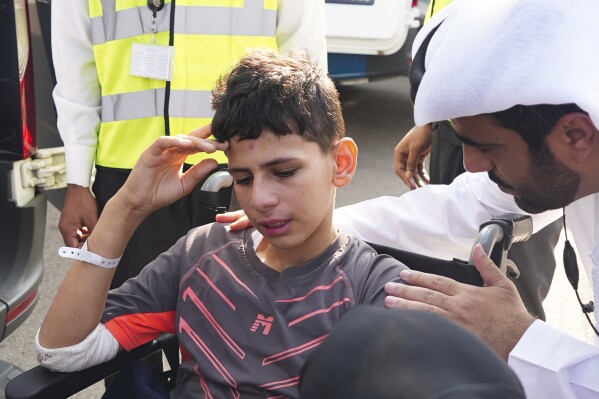Developing nations press rich world to better fight climate change at U.N. climate summit
DUBAI, United Arab Emirates (AP) — Leaders of developing nations jumped into Saturday’s second-day of a U.N. climate summit to press rich industrial countries to share their knowhow to fight global warming and ease the financial burdens they face — while trumpeting their own natural resources that swallow heat-trapping carbon in the air.
The 28th annual U.N. Conference of the Parties, or COP28, in the oil-rich United Arab Emirates featured about 150 presidents, prime ministers, royals and other leaders who are presenting their plans to cut heat-trapping emissions and mostly seek unity with other nations to avert climate catastrophe that seemed to draw closer than ever in 2023.
The developing world took center stage early Saturday. Several African leaders noted their continent’s rainforests help gobble up excess carbon dioxide in the air and emphasized how their countries belch out only a tiny fraction of heat-trapping emissions compared to richer countries.
Teodoro Obiang Nguema Mbasogo of Equatorial Guinea — one of sub-Saharan Africa’s biggest oil producers — faulted developed nations for failing to deliver on their pledges to meet their commitments on financing for climate action and meet their own targets to curb their industries’ emissions.
 Pressure builds to eliminate fossil fuel use as oil executive takes over climate talks
Pressure builds to eliminate fossil fuel use as oil executive takes over climate talks
 Skyscraper-studded Dubai has flourished during regional crises. Could it benefit from hosting COP28?
Skyscraper-studded Dubai has flourished during regional crises. Could it benefit from hosting COP28?
 First group of wounded Palestinian children from Israel-Hamas war arrives in United Arab Emirates
First group of wounded Palestinian children from Israel-Hamas war arrives in United Arab Emirates
“Africa is one of the regions in the world that sequesters the most carbon and emits oxygen,” he said.
President Jose Ramos Horta of Timor-Leste, next to Indonesia and north of Australia, blasted “shark loans” from multilateral lending institutions, saying developing nations cannot recover from heavy debt burdens that squelch their ability to put money into fighting climate change and grow economically.
With U.S. President Joe Biden staying home, Kamala Harris was set to become the first U.S. vice president to lead America’s delegation since Al Gore — now a major climate activist — at COP3 in 1997.
As Harris made her way toward the Dubai venue, U.S. climate envoy John Kerry and French President Emmanuel Macron pushed for development of nuclear energy — which does not produce greenhouse gas emissions, even if it also presents security and waste challenges.
Overall, a group of more than 20 nations called for a tripling of nuclear energy generated in the world by 2050.
“I want here to reiterate the fact that nuclear energy is a clean energy and it should be repeated,” said Macron, whose country gets around two-thirds of its electricity from nuclear power, the most of any industrialized country, and exports some of it to France’s neighbors. “Nuclear energy is back.”
A declaration issued at the event did not specify how much money should be set aside, but urged the World Bank and others to “encourage” expanding lending for nuclear projects.
“We have to invest — I’m not saying give away,” Kerry said. “I’m saying invest the trillions of dollars that are sitting on the sidelines looking for bankable deals but not willing to move as fast as we need to move.”
Whatever their perspective or national interest, leaders almost universally voiced their shared views that Earth is in crisis — with the United Nations and other environmental groups warning that the planet has recorded the nine hottest years on record over the last decade.
Bolivian Vice President David Choquehuanca called for “saving Mother Earth and staving off the multiple crises which have been caused by neocolonial, capitalist, imperialist, patriarchal, Western culture.”
“The climate crisis is but the latest chapter in a long history of hypocrisy and lies: The ‘Global North’ is responsible for the global imbalance that we’re seeing,” he said, using a catchall term for industrialized countries. “They seek permanent growth to the detriment of the global South.”
German Chancellor Olaf Scholz said science shows that the world needs to “step up the pace” to battle climate change, but took a more upbeat tone, saying: “We have what it takes to meet these challenges. We have the technologies: wind power, photovoltaics, e-mobility, green hydrogen.”
He said a record number of gigawatts of renewable energy were fed into the grid and $1.3 billion invested globally in clean energies and technologies last year, while demand for fossil fuels has slowed and the peak is “in sight.”
Scholz laid out three proposals: He said the No. 1 priority should be development of renewable energies. He urged cooperation, citing a deal among 36 countries agreed Friday to create a “ climate club ” that aims to transform industry. And he touted “solidarity and responsibility,” saying Germany has made $6 billion available for climate finance.
“I’m therefore confident that we will also achieve our goal of making available $100 billion per year for international climate action together with the other industrialized countries,” he said. “We will use these funds to protect forests and biodiversity, adapt to climate change and reduce CO2 emissions globally, in particular in the most vulnerable countries.”
Rich countries previously aimed to reach that $100 billion target in 2020.
Worries are rising that the world is set to blow past — even obliterate — targets in the Paris climate accord of 2015 to cap the increase in global temperatures by the end of the century by 1.5 degrees Celsius (2.7 Fahrenheit) since the start of the industrial era.
“The bad news is that progress is too slow. We need to do more to cut emissions a lot more,” said Prime Minister Katrin Jakobsdottir of Iceland, calling for “nature-based solutions” and making polluters pay. “But we also need to do less. Our economic systems are focused on maximizing production and consumption rather than sustainability and well-being — and this needs to change.”
___
Associated Press journalist Jon Gambrell contributed.
___
Associated Press climate and environmental coverage receives support from several private foundations. See more about AP’s climate initiative here. The AP is solely responsible for all content.
Disclaimer: The copyright of this article belongs to the original author. Reposting this article is solely for the purpose of information dissemination and does not constitute any investment advice. If there is any infringement, please contact us immediately. We will make corrections or deletions as necessary. Thank you.

